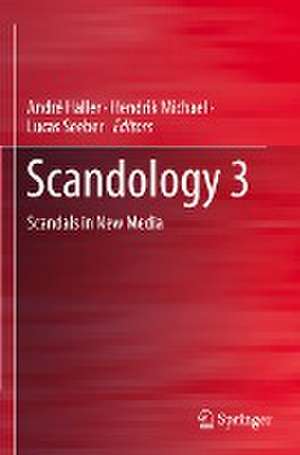Scandology 3: Scandals in New Media
Editat de André Haller, Hendrik Michael, Lucas Seeberen Limba Engleză Paperback – 24 noi 2022
The authors focus on the 21st century as an age of perpetual scandalization and on digital technologies as a catalyst in this respect. Against this backdrop, the book examines different aspects of the transformation of mediated scandals through digital communication practices.
Topics covered include, but are not limited to, the scandalizing potential of new media and the requirement of modified strategies of reputation management and crisis communication in politics, the entertainment industry, and the economic system among others; a different perspective on professional journalism and scandals created through new media; technological infrastructure and digital tools allowing journalists to establish new means to investigate hard scandals, i.e., substantial financial or political wrongdoings by the economic and political elite.
The book, therefore, is a must-read for researchers and scholars from different disciplines, as well as practitioners and policy-makers interested in a better understanding of the study of scandals, their impact on societies, and their catalyzation through new media.
| Toate formatele și edițiile | Preț | Express |
|---|---|---|
| Paperback (1) | 886.62 lei 6-8 săpt. | |
| Springer International Publishing – 24 noi 2022 | 886.62 lei 6-8 săpt. | |
| Hardback (1) | 892.59 lei 6-8 săpt. | |
| Springer International Publishing – 23 noi 2021 | 892.59 lei 6-8 săpt. |
Preț: 886.62 lei
Preț vechi: 1081.24 lei
-18% Nou
Puncte Express: 1330
Preț estimativ în valută:
169.66€ • 177.58$ • 141.21£
169.66€ • 177.58$ • 141.21£
Carte tipărită la comandă
Livrare economică 31 martie-14 aprilie
Preluare comenzi: 021 569.72.76
Specificații
ISBN-13: 9783030850159
ISBN-10: 3030850153
Pagini: 208
Ilustrații: VI, 208 p. 18 illus., 8 illus. in color.
Dimensiuni: 155 x 235 mm
Greutate: 0.32 kg
Ediția:1st ed. 2021
Editura: Springer International Publishing
Colecția Springer
Locul publicării:Cham, Switzerland
ISBN-10: 3030850153
Pagini: 208
Ilustrații: VI, 208 p. 18 illus., 8 illus. in color.
Dimensiuni: 155 x 235 mm
Greutate: 0.32 kg
Ediția:1st ed. 2021
Editura: Springer International Publishing
Colecția Springer
Locul publicării:Cham, Switzerland
Cuprins
Introduction.- Part 1 - Scandals and Digital Publics: Transformations of Power and Visibility.- Social Amplification of Scandals: One Social Media Effect.- Scandalous Criticism in the Speakers’ Corner: Online and Offline Reactions to Rezo’s The Destruction of the CDU and Jan Böhmermann’s #neustart19.- Are we living in a post scandal era? High-choice media environments, political polarization and their consequences for political scandals.- Part 2 - Forms, Functions, and Practices of Scandal Reporting in changing Media Environments.- Gossip as journalism and journalism as gossip: A cultural history investigation of two royal sex scandals in Sweden 1890 and 2010.- Italian newspapers and corruption scandals coverage: the construction of the “parallel trial”.- Part 3 - Scandals, New Media and the Historical Perspective.- Early Modern Sermon and Scandalization? The Sermons of the Jesuit Georg Scherer (1540-1605).- Revenge for Caligula!“ Ludwig Quidde, Wilhelm II and the scandal of 1894.- Having the Last Laugh: Scandalous Character Assassination in Comedy in Classical Athens and the Current-Day United States.- Part 4 - New Media, Scandals in Culture, and Public Protest.- Hips don’t lie: Visual resistance to discoursal normalization of sexual violence in the Israeli SlutWalk movement.- Scandalogy Meets Field Theory. Utilizing Scandal Theory for the Analysis of Journalistic Practices Over Time.- “The Voice Kids” Scandal in Russia: How the Voiceless Found Their Voice.
Notă biografică
André Haller is professor for Marketing, Communication Management, and Digital Marketing at the University of Applied Sciences Kufstein Tyrol (Austria). His research interests are: digital campaigns, political communication, and scandal and crisis communication.
Hendrik Michael is a research assistant at the Institute of Communication Studies at the University of Bamberg (Germany). His research focus is on theories of journalism, transformations of media genres, and journalistic storytelling.
Lucas Seeber is a research assistant at the Institute of Communication Studies at the University of Bamberg (Germany). His research focus is on strategic and political communication, digital transformation, and campaign communication.
Hendrik Michael is a research assistant at the Institute of Communication Studies at the University of Bamberg (Germany). His research focus is on theories of journalism, transformations of media genres, and journalistic storytelling.
Lucas Seeber is a research assistant at the Institute of Communication Studies at the University of Bamberg (Germany). His research focus is on strategic and political communication, digital transformation, and campaign communication.
Textul de pe ultima copertă
This book presents research on mediated scandals and substantiates the understanding of such forms of scandals and their impact on societies. Additionally, it connects the study of scandals with the broader fields of political communication research, organizational communication, journalism studies, and digital communication research.
The authors focus on the 21st century as an age of perpetual scandalization and on digital technologies as a catalyst in this respect. Against this backdrop, the book examines different aspects of the transformation of mediated scandals through digital communication practices.
Topics covered include, but are not limited to, the scandalizing potential of new media and the requirement of modified strategies of reputation management and crisis communication in politics, the entertainment industry, and the economic system among others; a different perspective on professional journalism and scandals created through new media; technological infrastructure and digital tools allowing journalists to establish new means to investigate hard scandals, i.e., substantial financial or political wrongdoings by the economic and political elite.
The book, therefore, is a must-read for researchers and scholars from different disciplines, as well as practitioners and policy-makers interested in a better understanding of the study of scandals, their impact on societies, and their catalyzation through new media.
Caracteristici
Presents current empirical and theoretical findings on scandalization processes in new media environments Continues the successful book series “Scandalogy” including international expert knowledge Offers scientific analyses on scandal communication in new media environments
